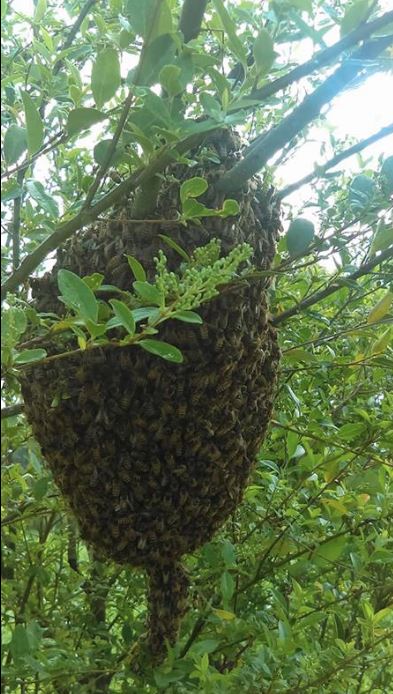Here at Louderbranch Farms Honey Bees are an important part of our farm. Honey bees are responsible for the pollination of the food crops we grow and eat such as cucumbers, squash, tomatoes and berries. Honey bees range three to five miles a day foraging away from the hive, so the size of your lot does not really matter if it is an open field or a back yard.
Keeping bees makes you more environmentally conscious. When people ask us if we use chemicals on the farm we just reply we have honey bees and that is not a practice you can have when you keep bees. We are always worried that someone in the area may use chemicals that our bees could get into since they do travel three to five miles a day. If your bee returns to the hive with chemicals on them it is really bad for your colony.
The learning curve to keeping bees is pretty extreme. We read a lot of books and forums. We also watch a lot of You Tube videos to help improve our bee keeping skills and our honey harvest. We also took some bee classes and was members of our local bee club.
If the thought of hundreds to thousands of bees in close proximity to you just isn't your thing then here are some things you can do to help the honey bee population. You can plant a small garden with vegetables or flowers. If you don't have the space just add a few planters outside with flowers that attract the beneficial insects such as bees.
Flowers that attracts bees are alyssum, echinacea (cone flowers), geraniums, bee balm (monarda), black-eyed Susan's, sun flowers and clover. Bees also love many flowering herbs and vegetables especially mints. Honey bees also need a lot of water so fill up an empty shallow container that is not steep with some water in it for them to drink. Also add a stick or something for them to land on so they won't drown. Weeds to you are not always weeds to a honey bee. They are forage for the bees.
In some of my reading I read a quote from a beekeeping specialist from Clemson University. Jennifer Tsurada states that "Bees are sort of the new back yard chickens."
Keeping bees makes you more environmentally conscious. When people ask us if we use chemicals on the farm we just reply we have honey bees and that is not a practice you can have when you keep bees. We are always worried that someone in the area may use chemicals that our bees could get into since they do travel three to five miles a day. If your bee returns to the hive with chemicals on them it is really bad for your colony.
The learning curve to keeping bees is pretty extreme. We read a lot of books and forums. We also watch a lot of You Tube videos to help improve our bee keeping skills and our honey harvest. We also took some bee classes and was members of our local bee club.
If the thought of hundreds to thousands of bees in close proximity to you just isn't your thing then here are some things you can do to help the honey bee population. You can plant a small garden with vegetables or flowers. If you don't have the space just add a few planters outside with flowers that attract the beneficial insects such as bees.
Flowers that attracts bees are alyssum, echinacea (cone flowers), geraniums, bee balm (monarda), black-eyed Susan's, sun flowers and clover. Bees also love many flowering herbs and vegetables especially mints. Honey bees also need a lot of water so fill up an empty shallow container that is not steep with some water in it for them to drink. Also add a stick or something for them to land on so they won't drown. Weeds to you are not always weeds to a honey bee. They are forage for the bees.
In some of my reading I read a quote from a beekeeping specialist from Clemson University. Jennifer Tsurada states that "Bees are sort of the new back yard chickens."
